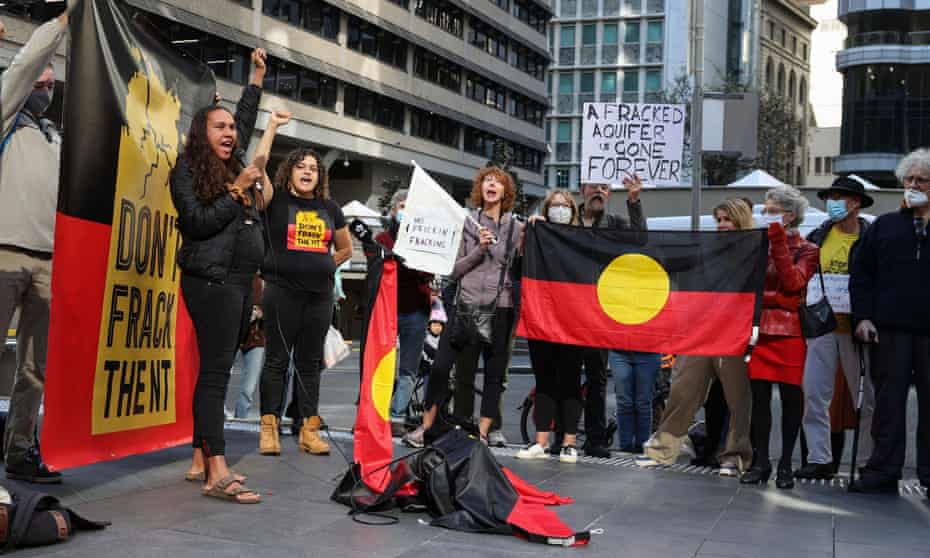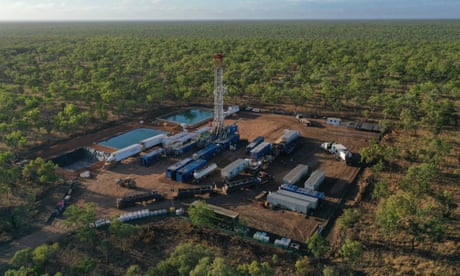Extract from The Guardian
Legal challenge to Keith Pitt’s decision claims development of Beetaloo Basin could potentially lift Australia’s emissions by 13%.

Last modified on Tue 2 Nov 2021 16.54 AEDT
The federal resources minister, Keith Pitt, made no effort to assess the impact on global heating of handing $21m to Empire Energy to frack the Beetaloo Basin, despite evidence that exploiting the region’s gas would drive up Australia’s emissions by 13%, a court has heard.
The federal court on Tuesday began hearing a challenge to the lawfulness of federal grants designed to incentivise exploratory drilling in the Northern Territory as part of the Morrison government’s gas-led economic recovery.
The case, described by litigants Environment Centre NT, as a landmark piece of climate litigation, argues the minister was required to make reasonable inquiries into a range of matters before awarding Empire $21m from the $50m grant program, including the consequences for global heating and Australia’s targets under the Paris climate agreement.
Pitt, who is defending his decision, has previously described the case as “green lawfare” and said the litigation threatens to delay an estimated 6,000 new jobs for the Northern Territory along with around $37bn in economic activity
Perry Herzfeld, SC, – acting for the Environment Centre NT, which launched the case – argued on Tuesday that the government’s failure to investigate the climate consequences was “stark”.

“There were no inquiries made into climate change risks at all, and, further, no inquiries made into whether such inquiries should be made or deferred until later,” Herzfeld told the court.
“There’s nothing in the material before your honour which suggests any engagement with this at all.”
He showed the court expert evidence suggesting that extracting and using gas from the Beetaloo Basin would use up the rest of Australia’s carbon budget under the Paris agreement.
On one scenario, it would drive up Australia’s greenhouse gas emissions by 13%.
“What’s observed is that combustion of gas from the Beetaloo Basin shale field would equate to a 13% increase on Australia’s 2020 greenhouse gas emissions, these are annual emissions,” he said.
Herzfield argued that any activity in the Beetaloo, even exploration, would harm Australia’s prospects of meeting its Paris agreement targets.
He also argued it was not clear that the plan for Beetaloo would deliver a net economic benefit to Australia and said there was a risk that it could become a “stranded asset that has failed to deliver a return on investment”.
The court also heard that a request for confidentiality over a range of documents linked to the case had been agreed to by the parties due to much of it containing “market sensitive information”.

But the request caused justice John Griffiths significant concern.
“It just strikes me that the claim for confidentiality is too broad and in some respects unsubstantiated,” he said.
In one exchange, the court was taken to Pitt’s announcement of the Beetaloo strategic plan on 17 December 2020, in which he described the basin as the “hottest play on the planet”.
Griffiths asked: “What’s the ‘hottest play on the planet’, Mr Herzfield?”
Herzfield suggested the phrase meant that the Beetaloo was the “most exciting gas resources on the planet at the moment”.
Griffiths said: “The ‘hottest play’ is not a reference to climate change, I assume?”
Herzfield responded “decidedly not”, prompting Griffiths to quip: “You didn’t actually have to answer that.”
Herzfield is arguing that the failure to properly consider the climate risks meant that the government breached section 71 of the Public Governance, Performance, and Accountability Act 2013, which states that a minister “must not approve a proposed expenditure of relevant money unless the Minister is satisfied, after making reasonable inquiries, that the expenditure would be a proper use of relevant money”.
He argued that should invalidate the grants to Empire.
Tom Howe, QC, representing the minister, argued later on Tuesday that the expert evidence did not give any indication of the likely emissions specifically from the three wells Empire wants to use to explore the basin. The purpose of the grants was to fund those wells and those wells only, he said.
Howe also argued that a finding that the minister had not reasonably inquired into climate risk did not necessarily mean the grants should be invalidated.
The hearing continues on Wednesday.
No comments:
Post a Comment